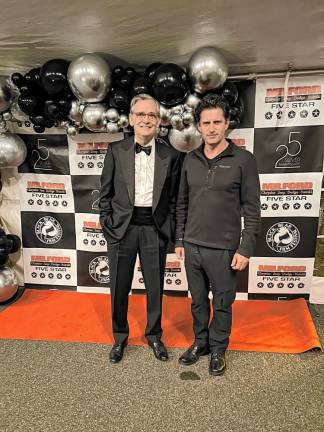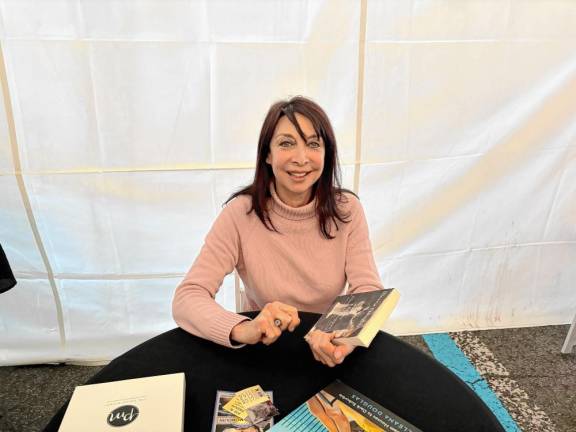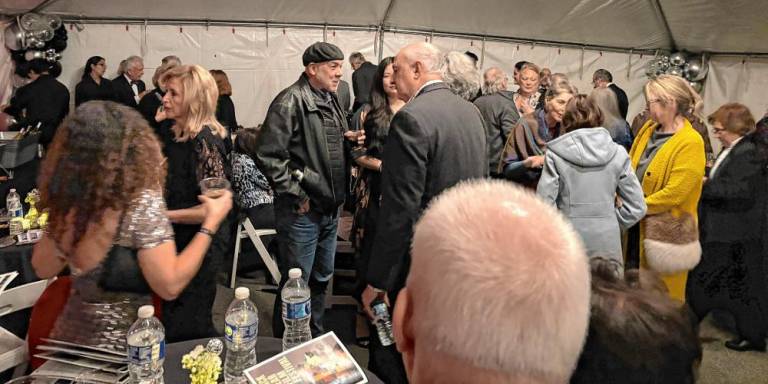Black Bear Film Festival – 25 years of memories
Milford. The annual festival included a screening of the locally relevant documentary “Burying the Hatchet.”



The year was 2000 and Jerry Beaver, a well-known casting director from New York with a weekend house at Twin Lakes, started the Black Bear Film Festival (BBFF) with some of his close friends. Chief among these were Davis Chant (Chant Realty), attorney John (Duke) Schneider, and Milford Mayor Sean Strub. They had wonderful ideas and were all very committed. The festival was held at the Milford Theater, then an art deco, fairly dilapidated structure that Beaver eventually bought. There was a lot of love in that rickety old building with terrible acoustics, lumpy seats, and very little heat in the cold weather. After Beaver’s reign, several other locals tried their hand at leading the festival, including Will Voelkel, Robert John Keiber, Nancy Pitcher, and finally the current president, Max Brinson. In the meantime, local businessman Bill Rosado, president of the Milford Hospitality Group, bought the theater and renovated it to its modern-day glory with great acoustics and comfortable seats, making it a theater that any professional could be proud of. It is also now the home of the Black Bear Film Festival.
Veronica Coyne, current BBFF executive director, points out, “With each year and each festival we learned and expanded our vision of what the festival should and could be.” Board member John DiLeo, a film historian/author and an integral part of the current BBFF with his own movie series, said, “I couldn’t be happier with this year’s festival. Both last year and especially this year, the film committee [of which DiLeo is a member] produced a slate of films with great variety, and with which the audience satisfaction was measurably greater.”
Part of the reason for the great success of this celebratory 25th year was the world premiere of a new documentary called “Burying the Hatchet – The Tom Quick Story.” “More than 200 years ago, Tom Quick Jr., the first white child born in this region, who had witnessed his father’s death at the hands of the local Lenape, made it his goal to kill as many [native people] as he could. He killed 99 and became a hero in local lore. He was the Davy Crockett of Milford. Mayor Sean Strub, in an effort to redress this ugly chapter in Milford’s history, reached out to the leadership of the Lenni Lenape tribe which had been dislocated from their Milford homeland and began the lengthy and difficult process of bringing these two groups together. The film is about how one largely white community and its disenfranchised tribal leaders worked together to reconcile the past and forge a shared path forward to reestablish a Lenape presence here, their original land, based on trust and an inspiring and healing vision of the future.”
Strub produced the film, which was written and directed by Christopher King with associate producer Daniel Strongwalker Thomas. The audience was totally enthralled with the film and the very powerful local story it told. This film will be soon making the rounds of various film festivals around the world.
Another highlight of the festival was the celebrity guest, Illeana Douglas, granddaughter of Melvyn Douglas. His classic film, “Mr Blandings Builds his Dream House” was the feature film and it was notable that it held up well after all these years. John DiLeo interviewed Douglas, and they spoke about her latest book, “Connecticut in the Movies,” as well as the many movie roles she has played. DiLeo remarked, “She was so natural and funny. I really enjoyed interviewing her.”
There were a great variety of films on the Mainstage, as well as shorter films in salons at Good Shepherd Episcopal Church, TriVersity, Grey Towers and the Columns Museum, which houses a large exhibit on the Lenape people.
Veronica Coyne remarked, “It is interesting that three novice filmmakers won awards for their work in the awards ceremony on Sunday at the end of the festival. They were ‘Refuge,’ ‘And Through the portal we go,’ and ‘Nobody wants to shoot a woman.’”
Coyne also pointed out that unlike previous festivals where some of the films were also available on streaming services, all of the films here were unique to the festival with the one exception of “Thelma.”
In closing this 25th anniversary festival, President Max Brinson said, “It is wonderful to celebrate the past so that we can look forward to embracing the future!